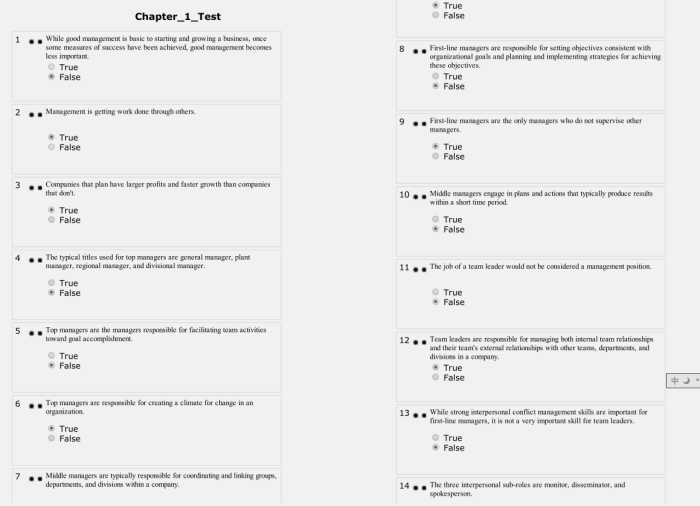Mgmt 12th edition chuck williams pdf – Embark on an intellectual journey with “Management” 12th Edition by Chuck Williams, a seminal text that reshapes the landscape of management education. This comprehensive guidebook delves into the intricacies of modern management, empowering readers with the knowledge and skills to navigate the complexities of the business world.
With its rigorous analysis, practical applications, and thought-provoking insights, “Management” 12th Edition establishes itself as an indispensable resource for students, professionals, and anyone seeking to enhance their managerial capabilities.
1. Introduction to Management 12th Edition by Chuck Williams
The 12th edition of Management by Chuck Williams is a comprehensive textbook that provides a thorough overview of the fundamental concepts and theories of management. It features updated content, case studies, and applications that reflect the latest trends and challenges in the field.
The textbook is organized into 10 chapters, each covering a specific aspect of management. The chapters are structured in a logical sequence, beginning with an introduction to management and progressing through the core concepts of planning, organizing, leading, and controlling.
2. Core Concepts and Theories in Management

The textbook covers the fundamental concepts and theories of management, including:
- Planning: The process of setting goals, developing strategies, and making decisions.
- Organizing: The process of creating a structure for the organization and allocating resources.
- Leading: The process of motivating and inspiring employees to achieve organizational goals.
- Controlling: The process of monitoring performance and taking corrective action.
These concepts and theories are essential for understanding how organizations operate and how managers can effectively lead and manage their teams.
3. Planning and Decision-Making
The planning process involves setting goals, developing strategies, and making decisions. The textbook provides a detailed analysis of each step in the planning process, including:
- Goal setting: The process of identifying and defining the desired outcomes.
- Strategy formulation: The process of developing a plan to achieve the desired outcomes.
- Decision-making: The process of choosing the best course of action.
The textbook also discusses the importance of environmental scanning and stakeholder analysis in planning.
4. Organizing and Staffing
The organizing process involves creating a structure for the organization and allocating resources. The textbook explains the principles of organizational structure and design, including:
- Departmentalization: The process of grouping activities into departments.
- Span of control: The number of employees that a manager can effectively supervise.
- Centralization vs. decentralization: The degree to which decision-making authority is centralized at the top of the organization or decentralized to lower levels.
The textbook also discusses the processes of recruitment, selection, and training and development.
5. Leading and Motivating
The leading process involves motivating and inspiring employees to achieve organizational goals. The textbook analyzes different leadership styles and theories, including:
- Transactional leadership: A style of leadership that focuses on rewards and punishments.
- Transformational leadership: A style of leadership that focuses on inspiring and motivating followers.
- Charismatic leadership: A style of leadership that is based on the leader’s personal charisma.
The textbook also discusses the importance of motivation in the workplace and explains various motivation theories.
6. Controlling and Performance Management
The controlling process involves monitoring performance and taking corrective action. The textbook explains the purpose and process of controlling, including:
- Setting standards: The process of establishing performance expectations.
- Measuring performance: The process of collecting data on actual performance.
- Taking corrective action: The process of taking steps to improve performance.
The textbook also discusses the role of performance management in employee development and organizational success.
7. Management in the Global Environment
The textbook analyzes the challenges and opportunities of managing in a globalized business environment. It discusses the impact of cultural differences, international trade, and technology on management practices.
8. Case Studies and Applications
The textbook includes a number of case studies and applications that help students apply management concepts and theories to real-world situations. These cases and applications cover a wide range of topics, including:
- Leadership in a global environment
- Motivating employees in a diverse workforce
- Managing change in a rapidly changing environment
These cases and applications help students to develop their critical thinking skills and to apply management concepts to practical problems.
9. Ethical and Social Responsibility in Management
The textbook discusses the ethical and social responsibilities of managers. It explains how managers can balance economic, social, and environmental considerations in their decision-making.
10. Emerging Trends in Management
The textbook identifies and analyzes emerging trends in management, such as the use of artificial intelligence, remote work, and sustainability. It discusses the implications of these trends for the future of management practices.
Q&A: Mgmt 12th Edition Chuck Williams Pdf
What are the key features of “Management” 12th Edition?
The 12th Edition offers a comprehensive update with new case studies, real-world examples, and cutting-edge research. It emphasizes the latest trends in management, including sustainability, digital transformation, and global business.
How does “Management” 12th Edition approach management concepts?
The text takes a practical and applied approach, grounding theoretical concepts in real-world scenarios. It provides numerous examples, case studies, and discussion questions to facilitate understanding and application.
What are the benefits of using “Management” 12th Edition in the classroom?
Educators value the text’s clear organization, engaging writing style, and abundance of pedagogical features. Its comprehensive coverage and contemporary perspectives make it an ideal resource for undergraduate and graduate management courses.